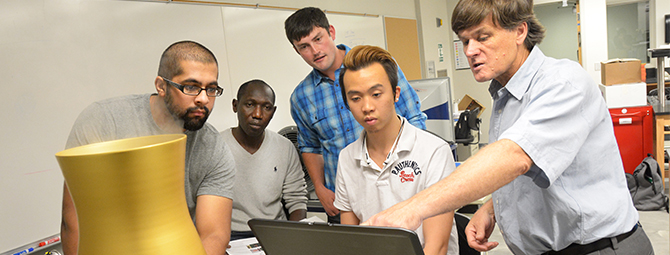Department of Mechanical & Manufacturing Engineering
Missions, Goals and Objectives
Mission Statement
To provide excellence in education and scholarly expertise to industry in Mechanical Engineering, Manufacturing Engineering and Engineering Management to meet the needs of the constituencies and serve the economics of the state of Minnesota and the nation.
Department Values
The department strives to achieve high levels of student success and satisfaction. All faculty share guiding principals they work towards to achieve high student satisfaction levels.
Program Educational Objectives
- Apply a broad, fundamental-based knowledge and up-to-date skills required in performing professional work in Mechanical and Manufacturing Engineering and related disciplines.
- Complete comprehensive design work pertaining to Mechanical and Manufacturing Engineering, incorporating the use of design standards, realistic constraints and consideration of the economic, environmental and social impact of the design.
- Identify, analyze and solve Mechanical and Manufacturing Engineering problems as a continuous process to gain competitive advantages in industry.
- Pursue a productive career in an industrial or governmental organization as a leader and as a member of multi-disciplinary and cross-functional teams, with an appreciation for the value of ethic and cultural diversity and an understanding of contemporary issues.
- Enter graduate programs in Mechanical and Manufacturing Engineering and related disciplines and to pursue lifelong learning and professional licensure.
Program Student Outcomes
Graduates of the Department of Mechanical and Manufacturing Engineering at St. Cloud State University will have the:
- Ability to identify, formulate, and solve complex engineering problems by applying principles of engineering, science, and mathematics.
- Ability to apply the engineering design process to produce solutions that meet specified needs with consideration for public health and safety, and global, cultural, social, environmental, economic, and other factors as appropriate to the discipline.
- Ability to develop and conduct appropriate experimentation, analyze and interpret data, and use engineering judgment to draw conclusions.
- Ability to communicate effectively with a range of audiences.
- Ability to recognize ethical and professional responsibilities in engineering situations and make informed judgments, which must consider the impact of engineering solutions in global, economic, environmental, and societal contexts.
- Ability to recognize the ongoing need to acquire new knowledge, to choose appropriate learning strategies, and to apply this knowledge.
- Ability to function effectively as a member or leader of a team that establishes goals, plans tasks, meets deadlines, and creates a collaborative and inclusive environment.
